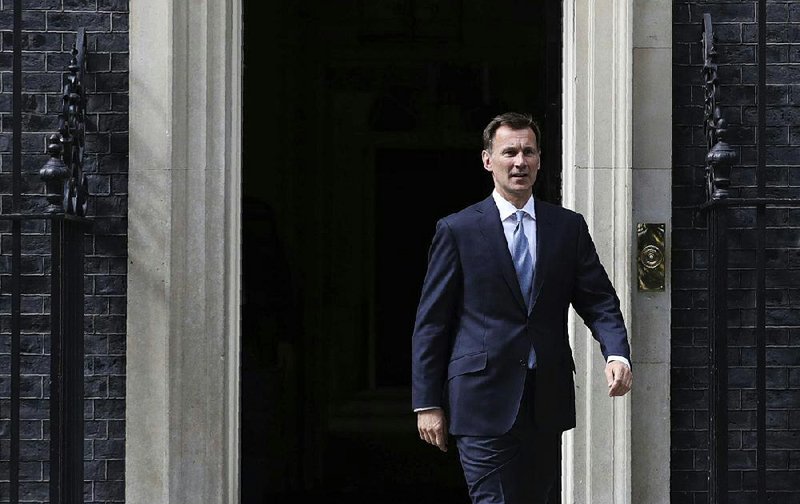LONDON -- Britain on Saturday threatened Iran with "serious consequences" for seizing a British-owned oil tanker the previous evening as the government warned U.K. vessels to avoid the crucial shipping lanes of the Strait of Hormuz.
The British government said in a statement after an emergency meeting that it had "advised U.K. shipping to stay out of the area for an interim period."
The capture of the tanker -- two weeks after British forces impounded an Iranian tanker near Gibraltar -- escalates a crisis between Iran and the West after three months of rising tensions that last month took the United States to within minutes of a military strike against targets in Iran. A fifth of the world's crude oil supply is shipped from the Persian Gulf through the Strait of Hormuz off the coast of Iran, and oil prices spiked sharply on Friday even before the British warning.
Senior Iranian officials said Saturday that the seizure of the tanker was a response to Britain's role in impounding an Iranian supertanker first, as newly released video of the incident showed Iranian commandos in black ski masks and fatigues rappelling from a helicopter onto the vessel in the Strait of Hormuz.
The British defense minister, Penny Mordaunt, said in a television interview Saturday that the ship had been intercepted in Omani, not Iranian, waters and called the seizure "a hostile act."
The U.K. has demanded the immediate release of the Stena Impero and on Saturday summoned Iran's charge d'affaires, Mohsen Omidzamani, in London.
A second emergency Cabinet meeting was set to begin later Saturday.
U.K. Foreign Secretary Jeremy Hunt said Britain's response "will be considered but robust."
In comments Saturday on Twitter, he said he spoke with Iran's foreign minister and expressed extreme disappointment that the Iranian diplomat had assured him Iran wanted to de-escalate the situation but "they have behaved in the opposite way."
He wrote: "This has [to] be about actions not words if we are to find a way through. British shipping must & will be protected."
The U.K. plans to take further measures this week, Hunt said in a statement without describing the action. The Sunday Telegraph said diplomatic and economic measures, including a freeze on Iranian assets, are being considered and the U.K. may push the European Union and United Nations to reimpose sanctions.
Setting the stage for a prolonged standoff, Iranian news agencies reported Saturday that all 23 crew members of the British-flagged tanker would be held onboard in Iran's Bandar Abbas Port during a criminal investigation of the ship's actions.
None of the crew members is British or American. Iranian news agencies said their nationalities included Indian, Russian, Latvian and Filipino, but 18, including the ship's captain, are Indian.
A spokesman for the Indian foreign ministry said it had contacted Iran "to secure the early release and repatriation of Indian nationals," the Hindu newspaper reported.
DIFFERING VIEWS
Hunt said the seizure of the Stena Impero shows worrying signs Iran may be choosing a dangerous and destabilizing path. He also defended the British-assisted seizure of Iran's supertanker earlier this month as a "legal" move because the vessel was suspected of breaching European Union sanctions on oil shipments to Syria.
The view from Iran was different.
In comments Saturday on Twitter, Iranian Foreign Minister Mohammad Javad Zarif characterized the seizure of Iran's tanker July 4 as "piracy." Politician and former Revolutionary Guard commander, Maj. Gen. Mohsen Rezai, wrote that Iran was not seeking conflict, "but we are not going to come up short in reciprocating."
Iran's Guardian Council, which oversees major foreign-policy decisions, sought to justify Friday's seizure as "reciprocal action" after British forces had impounded the Iranian tanker near Gibraltar.
"The rule of reciprocal action is well known in international law," the spokesman, Abbas Ali Kadkhodaei, said Saturday, according to the semiofficial Fars news agency.
But other Iranian authorities on Saturday added other rationales for the seizure of the ship, saying for the first time that the vessel had been involved in an accident with an Iranian fishing boat and that the tanker had ignored distress calls.
The Revolutionary Guard, which is in charge of Iranian naval activities in the Persian Gulf, had said Friday that it had seized the ship for deviating from traffic patterns and polluting the waters. The Revolutionary Guard had not mentioned a fishing boat.
Stena Bulk, the owner of the ship, said the tanker had been in "full compliance with all navigation and international regulations" when it was intercepted.
The tit-for-tat move by Iran drew condemnation from European signatories to Iran's nuclear accord with world powers.
France in a statement Saturday called on Iran to respect "the principle of freedom of shipping in the Gulf." Germany strongly condemned Iran's actions as "unjustifiable."
"Another regional escalation would be very dangerous" and "undermine all ongoing efforts to find a way out of the current crisis," the German government warned in a statement.
Europe has struggled to contain the tensions that stem from President Donald Trump's decision to pull the U.S. from Iran's nuclear deal, which had lifted sanctions on Iran in exchange for compliance on its nuclear program.
Trump has since reimposed sweeping sanctions on Iran, including its oil exports, and Iran recently increased uranium enrichment levels beyond limits of the deal in a bid to pressure Europe into finding a workaround for the crippling economic sanctions.
In Washington on Friday, Trump called Iran "nothing but trouble."
"We'll be working with the U.K.," Trump told reporters on the South Lawn of the White House. Referring in vague terms to the close American alliance with Britain, he added, "We have no written agreement, but I think we have an agreement that is long-standing."
Secretary of State Mike Pompeo said Saturday that the U.S. isn't willing to talk with Iran until it acts like a normal country. In Guayaquil, Ecuador, for meetings, Pompeo said Iran has shown "no signs" it wants to change direction on its nuclear and missile programs.
On Friday night, U.S. Central Command announced that it was putting in place "a multinational maritime effort" called Operation Sentinel that would "increase surveillance of and security in key waterways in the Middle East to ensure freedom of navigation in light of recent events in the Arabian Gulf region."
Britain, which remains a signatory to the nuclear accord, has figured prominently in rising U.S. tensions with Iran since British marines took part in the seizure of the Iranian oil tanker near Gibraltar, a British overseas territory off the southern coast of Spain. Officials there initially said the July 4 seizure happened on orders from the U.S.
Britain has said it would release the vessel, which was carrying more than 2 million barrels of Iranian crude, if Iran could prove it was not breaching EU sanctions. However, a court in Gibraltar on Friday extended the detention of the Panama-flagged Grace 1.
Information for this article was contributed by David D. Kirkpatrick and Stephen Castle of The New York Times; by Amir Vahdat, Aya Batrawy and Gregory Katz of The Associated Press; and by Alex Longley, Golnar Motevalli, Tim Ross, David Marino, Stephen Cunningham, Arsalan Shahla, Alyza Sebenius, Josh Wingrove, Kitty Donaldson and Nick Wadhams of Bloomberg News.
A Section on 07/21/2019

